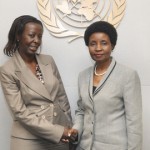 United Nations Women (UN Women) Founding Executive Director and Former President of Chile Michelle Bachelet has resigned from her position as the head of UN Women. Michellel Bachelet resigned after less than three years at the top of the organization (see our article Chilean Michelle Bachelet to Lead UN Women of September 15, 2010, here) . The organization was created to”promote the interests of women and girls across the globe.”
United Nations Women (UN Women) Founding Executive Director and Former President of Chile Michelle Bachelet has resigned from her position as the head of UN Women. Michellel Bachelet resigned after less than three years at the top of the organization (see our article Chilean Michelle Bachelet to Lead UN Women of September 15, 2010, here) . The organization was created to”promote the interests of women and girls across the globe.”
Photo: Louise Mushikiwabo and Asha-Rose Migiro
According to sources at the United Nations, Ms. Bachelet’s sudden departure surprised even the UN Secretary General and may highlight a growing malaise within the top leadership at the United Nations. The UN Secretary General has appointed an interim leader to immediately take over the helm of the UN Women organization. The new Acting Executive Director is the Indian Lakshmi Puri, Assistant Secretary-General and UN Women Deputy Executive Director.
The sources at the United Nations add that in June 2010, Ms. Michelle Bachelet had grudgingly accepted the position when the one she wanted, the Head of UNICEF, was given to former US White House Special Envoy William Anthony Kirsopp Lake, aka Tony Lake (see our article: UN Women Agency Born of July 2, 2010 here).
The departure of Michelle Bachelet opens up an opportunity for several unlucky candidates of 2010. The candidates included Ms Louise Mushikiwabo (see our article: UN Women Agency Born of July 2, 2010 here and “Rwandan Foreign Affairs Mushikiwabo on the Way Out?” of July 10, 2010 here). In early Summer 2010, Ms. Louise Mushikiwabo had lobbied the UN to get the position after her position as the new Rwandan Minister of Foreign Affairs was threatened by intrigues within the palace of Rwandan president General Paul Kagame.
After her appointment as Rwandan Minister of Foreign Affairs , following the unceremonious firing of her predecessor Rosemary Museminari, the tough talking Louise Mushikiwabo had taken on herself controversial cases, finding herself in the middle of intrigues among the Rwandan elite. One side was composed mostly of the people close to the Rwandan first lady, Janet Kagame, especially Mr. Muligande, Mr. Rujugiro, and Donald Kaberuka and the other side was composed of Kagame’s people especially David HImbara, Advisor on Development Strategy and Principal Private Secretary to the Rwandan President Paul Kagame.
David Himbara was eventually evicted from his position by the powerful group around Janet Kagame and returned to South Africa, where he taught after completing his doctorate studies at Queen’s College in Canada (see David Himbara: From Kagame’s Palace into Kagame’s Sight on October 2, 2012)
As a revenge, Kagame’s people managed to sideline Mr. Rujugiro, now exiled in South Africa and Mr. Muligande.
Now, Ms Louise Mushikiwabo has a new opportunity. According to sources at the United Nations, her chances have greatly improved. She is viewed as a strong capable woman, known for being outspoken and standing for causes she believes in. This view is shared by many political analysts contacted by AfroAmerica Network. As a sign of her improving odds, Ms Mushikiwabo was picked by the UN Secretary General to preside, in April 2013, the briefing on the “Prevention of Conflicts in Africa: Addressing the Root Causes”, with the emphasis on the impact on women and economic empowerment.
However, her chances may be threatened by the situation of the conflict in the Great Lakes region, where the Rwandan military negative involvement has been highlighted, and other strong candidates already lining up:
- the Indian Lakshmi Puri, Assistant Secretary-General and UN Women Deputy Executive Director;
- the Sierra Leonean Zainab Hawa Bangura, Special Representative of the Secretary-General on Sexual Violence in Conflict;
- The Tanzanian Asha-Rose Migiro, Special Envoy for HIV/AIDS in Africa of the United Nations Secretary-General and former UN Deputy Secretary-General;
- The Ugandan Rachel Mayanja, Special Adviser to the UN Secretary General on Gender Issues and Advancement of Women
- and other candidates from Tunisia, Norway, and South East Asia.
©2012 AfroAmerica Network.




Comments on this entry are closed.